|
|
Namibia, Tsauchab river
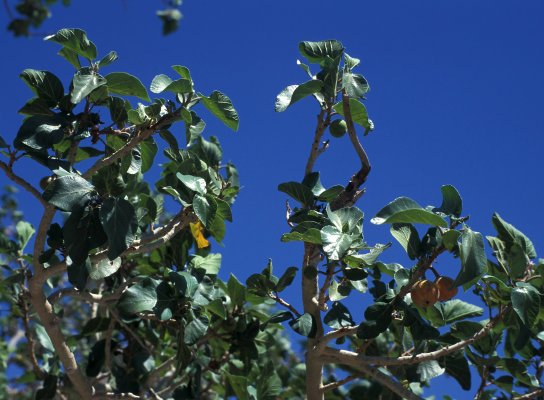
|
 |
|
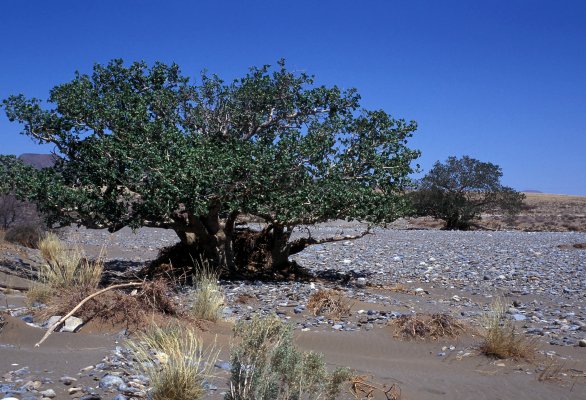
|
|
|
Ivory Coast |
|
 |
 |
|

|


|
|
Distribution
|

From South Africa and
Namibia to
Ethiopia and west to Senegal.
|
Biology
|
Pollinators:

Ceratosolen
arabicus
Mayr

Ceratosolen
galili
Wiebes
is a cuckoo.
Non-pollinating fig wasps:

Apocrypta longitarsus Mayr,
1906
Sycophaga gigas (Mayr, 1906)
Sycophaga
gracilis
(Wiebes,1967)

Sycophaga
sycomori
(Linnaeus,1758)
Sycophaga
valentinae Grandi,1952
Eukoebelea sycomori
Wiebes, 1967
Sycoscapteridea bambeyi (Risbec,
1951)
Ficomila
gambiensis (Risbec, 1955)
Syceurytoma ficus Bouček,
1981
Sycophila naso
Bouček, 1981 |
Habitat
|
In woodland, sometimes near streams, but
more often in hilly country or sometimes open grassland.
|
Frugivores
|
Birds, bats and monkeys feed on the ripe figs
facilitating seed dispersal. |
|
|
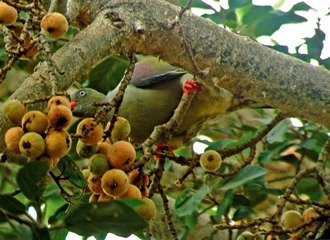
African Green Pigeon feeding on figs of
Ficus
sycomorus in South Africa (Photograph ©
Duncan
Butchart). |
Insects
|
The larval
stages of a variety of insects feed on the leaves or figs of Ficus
sycomorus including caterpillars of butterflies
and moths, some of which have developed remarkable strategies to
overcome the sticky latex contained in the leaves. Other insect larvae
bore into the branches feeding on the wood or suck sap from leaves or
figs. |
|
 |
Asota speciosa
(latex
sabotage by the Speciose Tiger moth caterpillar) |
|
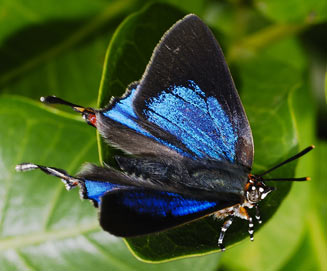 |
Myrina dermaptera
(Lesser fig-tree blue, Scarce fig-tree blue) |
|
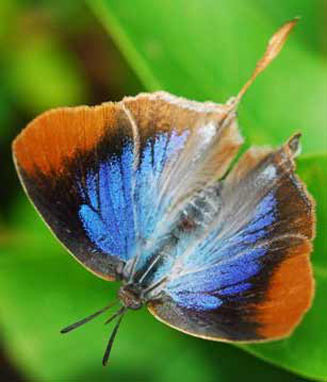 |
Myrina
silenus (Common
fig-tree blue) |
|
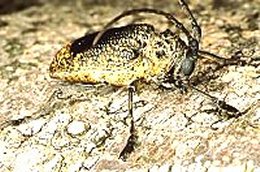
|
Beetle larvae of the
Fig tree borer beetle Phyrneta
spinator (Coleoptera) bore into the branches and trunks often
targeting water stressed, damaged or older trees
|
|
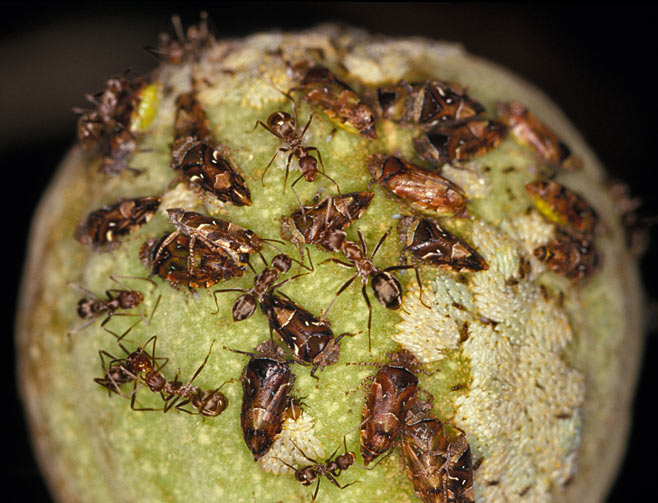 |
Leaf Hopper bugs
Hilda patruelis (Hemiptera)
suck the sap from figs and are tended for honeydew by pugnaceous ants Anoplolepis
custodiens or Pheidole megacephala. By patrolling
figs with bugs the ants reduce the impact of parasitoid fig wasps (which
oviposit through the fig wall) on
pollinator larvae and hence increase the reproductive fitness of the
tree. |
Description
|
(after
C.C. Berg in
Berg &
Wiebes, 1992) |
|
Biological
form
|
Tree
up to 15 m tall, terrestrial
|
|
Leaves
|
shape
& colour
|
elliptic
to subcordiform, chartaceous, apex rounded, base cordate to rounded, both
surfaces scabrous to puberulous
|
|
|
size
|
14x10
cm
|
|
|
lateral
veins
|
4-7
pairs, basal pair branched, reaching the margin at or below the middle of
the lamina
|
|
|
petiole
|
0.5-3
cm long, puberulous
|
|
Stipules
|
0.5-1
cm long, (sub)puberulous, caducous
|
|
Figs
|
position
|
on
20 cm long branchlets on the branches (ssp. sycomorus) or in the leaf axils (ssp. gnaphalocarpa)
|
|
|
shape
|
globose
to subpyriform, Æ
5 cm (fresh), (sub)puberulous
|
|
|
peduncle
|
0.3-0.6
cm long
|
|
|
basal
bracts
|
2.5-3
mm long
|
|
References
|
Berg, C.C. 1986. The Ficus species (Moraceae) of Madagascar and the
Comore Islands. Bulletin du Muséum national d’Histoire naturelle d’Histoire
Naturelle. Paris (4), 8: 17-55.
Berg,
C.C. 1988. New taxa and combinations in Ficus (Moraceae) in
Africa. Kew Bulletin 43: 77- 97.
Berg,
C.C. 1989. Moraceae. In: R.M. Polhill (ed.) Flora of Tropical East Africa.
A.A. Balkema, Rotterdam.
Berg,
C.C. 1990. Distribution of African taxa of Ficus (Moraccae).
[Proc. 12th AETFAT]. Mitt. inst. Allg. Bot. Hamburg 23: 401-405.
Berg, C.C. 1990. Annotated check-list of the Ficus species
of the African floristic region, with special reference and a key to the
taxa of southern Africa. Kirkia, 13: 253-291.
Berg,
C.C. 1991. Moraceae. In: E. Launert & G.Y. Pope (eds) Flora
Zambesiaca 9, 6. Natural History Museum, London.
Berg, C.C. & Hijman, M.E.E. 1989. Chapter 11. Ficus. Flora of
Tropical East Africa (ed. R.M. Polhill). 43-86. A.A. Balkema,
Rotterdam.
Berg,
C.C., Hijman, M.E.E. & Weerdenburg, J.C.A. 1984. Moracées (incl.
Cécropiacées). Flore du Gabon 26: 1–276.
Berg,
C.C., Hijman, M.E.E. & Weerdenburg, J.C.A. 1985. Moracées (incl.
Cécropiacées). Flore du Cameroun 28: 1–298.
Berg, C.C. & Wiebes, J.T. 1992. African fig trees and
fig wasps. Koninklijke Nederlandse Akademie van Wetenschappen.
Amsterdam, 1-298 pp.
Burrows, J. & Burrows,
S. 2003. Figs of southern & south-central Africa. Umdaus Press,
Hatfield. 379 pp.
|
Credits
|
Photographs and distribution maps © Simon van Noort (Iziko Museums of South Africa) or © Jean-Yves Rasplus (INRA).
Insect images
©
Hamish Robertson (Iziko Museums of South Africa). Butterfly images ©
Steve Woodhall. |
 |
Ficus
tiliifolia
Baker |
|